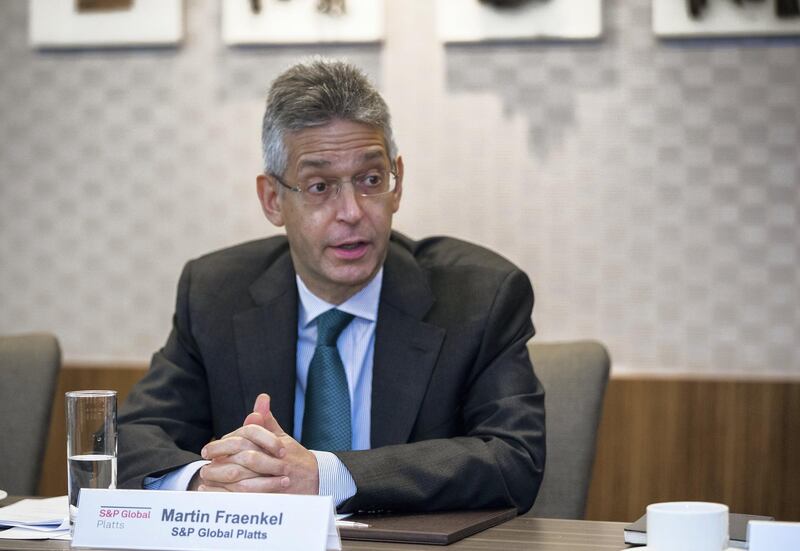Rising demand for liquefied natural gas (LNG) in the Middle East and Asia and the booming US supply will see an expansion of benchmarks to assess the pricing of the fuel, said the president of S&P Global Platts, which provides price assessments for energy products and commodities.
"LNG is a big topic for us. We're developing a whole suite of LNG price assessments to reflect how that market is rapidly developing," Martin Fraenkel told reporters in Dubai on Monday.
Platts' Japan Korea Marker (JKM) has been one of the strongest benchmarks for assessing the price of gas in the Asian markets, which have increasingly shifted to the cleaner fuel to curb rising pollution levels in cities such as Beijing and Shanghai.
China, the world's second largest importer of LNG, which is also covered by the JKM, has been looking to launch its own gas benchmark on the Chongqing Oil and Gas Exchange this year. The world's third largest consumer of gas, behind the US and Russia, also set up a similar gas exchange in Shanghai in 2015.
Platts has LNG markers for the Middle East as well as the US Gulf coast to monitor demand and supply respectively for spot cargoes.
The Middle East Marker, launched last year, covers spot price of cargoes delivered into the UAE, Egypt, Jordan, Kuwait as well as Pakistan. The price assessment will use the Egyptian port of Ain Sukhna as the basis point for the marker as the North African state, which will end LNG imports mid-year, currently accounts for over one third of the volume coming into the region.
This marker, however is "in its early days", said Mr Fraenkel as regional long term contracts have yet to expire and the LNG market is far less liquid in comparison with that of crude oil.
Saudi Arabia and the UAE,have looked to tap spot cargoes to meet growing demand for the fuel in power generation and as well as
to free up crude for export.
Both have confirmed interest in the booming US shale gas production for petrochemical developments , but also to meet peak power demand during the summer.
US gas producers could invite interest from the Middle East as they look to reach more markets, Chris Midgley, global content director for analytics for Platts told The National in an interview in Dubai. This could take place, although the 14.6 billion cubic feet gas storage capacity in Cove Point offshore the Gulf coast is the only LNG facility to come online in the US this year.
"The Middle East is moving towards gas. If you don’t have much spare capacity for oil, the best thing to do is to consume more gas and export the oil," he said.
____________
Read more:
[ Iraq closes in on 5 million barrels per day crude output capacity ]
[ Bahrain to start tight gas development this year ]
____________
Producers off the US Gulf coast are looking to secure more equity partnerships to boost production as investors remain wary of debt financing in an environment of increased production from Australia, Papua New Guinea and Qatar. The Arabian Gulf state announced last year plans for a 30 per cent jump in output over an unspecified period of time.
"[The challenge for the US] is to make the economics work for liquefaction plants. Qatar's [planned increase] really scared some of the investors [in LNG]," said Mr Midgley.
Meanwhile, as the life spans for LNG contracts decline and the market moves towards more spot cargoes, countries like Saudi Arabia and the UAE will look to explore options to deploy floating storage regasification units (FSRUs) after making "very small capital investments," he added.
Currently Kuwait and the UAE are the only two Gulf states importing LNG, but demand from other states will climb as LNG receiving terminals in Bahrain and Sharjah will open in 2019. Gas also forms part of a critical mix in the drive towards cleaner energy in the GCC. The UAE has tapped US supplies since 2016, when it received cargoes from Houston-based Cheniere Energy, while Kuwait, which also faces a gas deficit, signed a 15-year contract with Anglo-Dutch major Shell last month to import the fuel.







